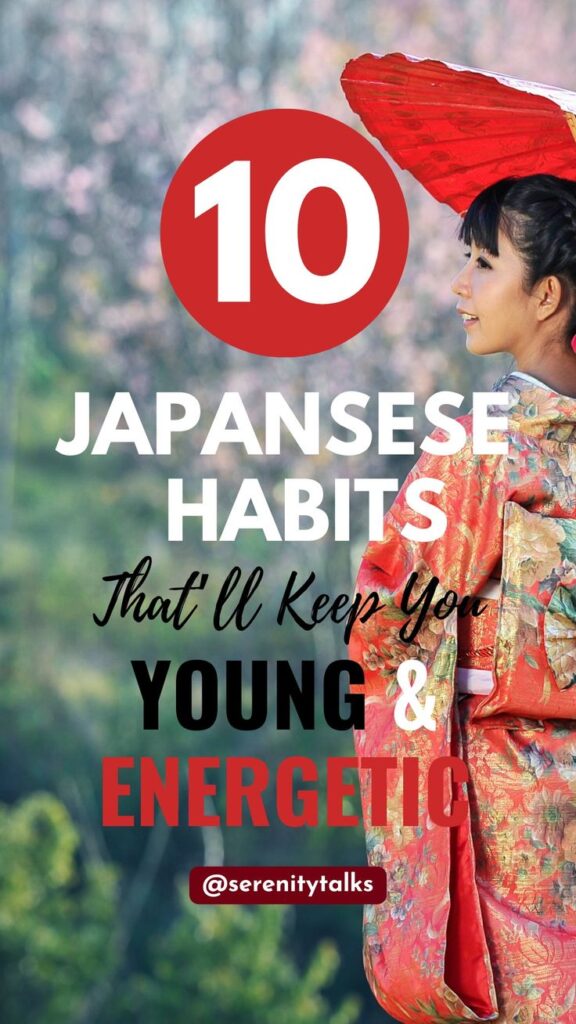This Post Contains Affiliate Links. Please Read Our Disclosure for Full Information.
Hey hey, bestie! 💕
Ever wondered how the Japanese stay so youthful, energetic, and glowing—literally well into their 80s and beyond?
Spoiler alert: It’s not about expensive products or crazy workouts. It’s all about simple, daily habits that nourish the mind, body, and soul.
So if you’re ready to steal their timeless secrets, let’s dive into these 10 Japanese longevity habits that’ll help you live longer, look radiant, and feel amazing—without the stress.

1. Eat Until You’re 80% Full (Hara Hachi Bu)
✅ The Japanese practice Hara Hachi Bu—which means stop eating when you’re 80% full.
✅ It’s a natural way to avoid overeating, keep your metabolism balanced, and maintain a healthy weight.
✅ Bye-bye food baby, hello glow!
2. Sip on Green Tea Daily
✅ Green tea is rich in antioxidants that fight aging, boost metabolism, and protect your skin from free radicals.
✅ The Japanese sip on it like it’s magic (because honestly—it is).
3. Walk, Walk, Walk
✅ Daily walking is huge in Japan.
✅ It keeps the heart healthy, burns calories, and boosts mental clarity—plus, it’s easy on the joints!
👉 Lightweight Walking Sneakers
4. Load Up on Fresh, Whole Foods
✅ The Japanese diet is packed with fish, seaweed, veggies, rice, and fermented goodies like miso.
✅ Minimal processed junk = maximum glow and longevity.
5. Practice Mindfulness & Minimalism
✅ A cluttered mind = a cluttered life.
✅ The Japanese embrace Zen philosophy and minimalism to reduce stress and stay mentally youthful.

6. Prioritize Community & Connection
✅ Loneliness = aging faster.
✅ The Japanese prioritize family, community, and friendships, which leads to happier, longer lives.
✅ Girl gang vibes = health goals.
👉 Cute Board Games for Quality Time
7. Embrace Hot Baths (Onsen Life)
✅ Hot mineral baths (Onsen) are a Japanese ritual that relaxes the body, reduces stress, and improves skin and circulation.
✅ Even a simple bath at home = total glow-up.
8. Eat More Seaweed & Fish
✅ Seaweed is loaded with minerals, iodine, and antioxidants that help with skin, metabolism, and thyroid health.
✅ The Japanese way = more omega-3s, less processed fats.
9. Stay Curious & Keep Learning
✅ Lifelong learning keeps the mind sharp and the soul young.
✅ The Japanese often engage in new hobbies, reading, or crafts—it’s their secret to staying mentally fit.
10. Ikigai: Live with Purpose
✅ Ikigai = your reason for waking up each day.
✅ Having purpose—no matter how big or small—keeps the spirit alive and the years younger.
Final Glow-Up Takeaway ✨
Babe, longevity isn’t about pushing yourself to extremes—it’s about small, daily habits that nourish your body, mind, and soul.
Steal a page from the Japanese playbook and start glowing from the inside out.
Drop a 🍵 if you’re ready to live your best long, happy life!
xoxo,
Serenity Talks 💕
We are giving it for free to our users
Get 7 Free Digital Planner
The Bundle Includes -
Daily Planner, Weekly Planner, Monthly Planner, Self Care Planner, Daily Reflection, Goal and Habit Tracker, Gratitude Journal and Budget Tracker

